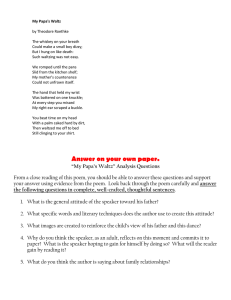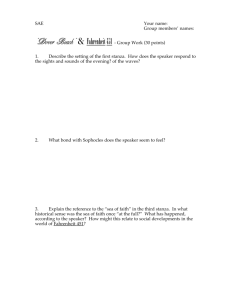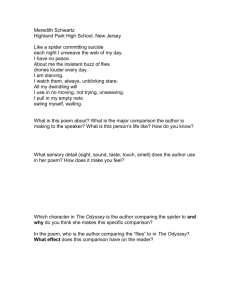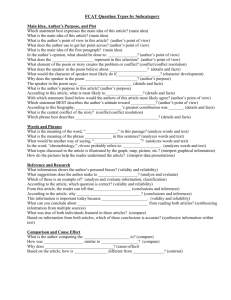As I Grew Older –Review for the test Basic Understanding
advertisement
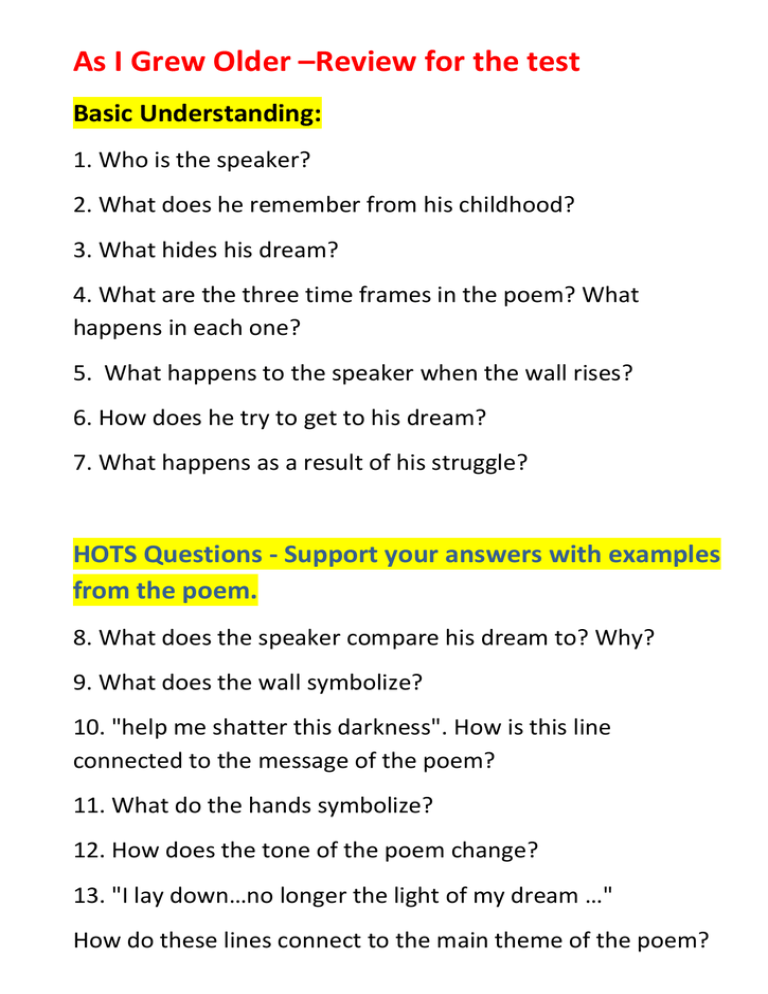
As I Grew Older –Review for the test Basic Understanding: 1. Who is the speaker? 2. What does he remember from his childhood? 3. What hides his dream? 4. What are the three time frames in the poem? What happens in each one? 5. What happens to the speaker when the wall rises? 6. How does he try to get to his dream? 7. What happens as a result of his struggle? HOTS Questions - Support your answers with examples from the poem. 8. What does the speaker compare his dream to? Why? 9. What does the wall symbolize? 10. "help me shatter this darkness". How is this line connected to the message of the poem? 11. What do the hands symbolize? 12. How does the tone of the poem change? 13. "I lay down…no longer the light of my dream …" How do these lines connect to the main theme of the poem? Extended HOTS Questions: Choose a Thinking Skill from the list to help you answer the question. 1. Which Two words are repeated in the poem? Why are they repeated? 2. What does the speaker feel when the wall rises? 3. How does the speaker plan to struggle the "wall"? 4. The speaker views life differently as he grows up. Explain. 5. Why does the speaker say "I'm black"? 6. How is the theme of segregation presented in the poem? Bridging Text and Context:Write a passage connecting the information to the poem.Support your answer with details from the poem. Langston Hughes (1902- 1967) was a famous AfricanAmerican poet who lived during a time of worldwide racial oppression against black people. He was involved in the civil rights movement and wrote protest poetry. He believed that writing and art would bring about racial equality. Hughes was a part of the Harlem Renaissance as one of the first poets to promote African-American culture, such as jazz music, which is particularly loved for its elements of free expression. Until the end of the American Civil War (1865), in the southern states African-Americans were held as slaves. However, even after they were freed, they were not treated as equals. Only one hundred years later, in 1950-1960, they began fighting for equal rights. Text Analysis The poem is about the inability to achieve childhood dreams because of racism and prejudice. When the speaker was young, he had dreams of achieving great things. His dreams were "Bright like a sun". As he grew up, he experienced prejudice and racial discrimination, and his naive and optimistic dreams were shattered. The racism and prejudice that the speaker encountered because of his skin color are "the wall" that grew higher until it blocked his childhood dreams, causing him to live in a "shadow" of depression and despair. In the last stanza, the poet commands his hands to break through the wall so that he can overcome the prejudice and achieve his dreams. The speaker believes he can break through the barrier of being born with a black skin in a white-dominant society. Thus the poem ends with a tremendous hope and strength. It also suggests that, even for older people who seem to have lost sight of a dream, it is never too late to fight for it. The Theme of the poem The poem is a comment not only on racial prejudice and discrimination but any form of oppression that makes people unable to fulfill their dreams, whether it is because of age, gender, nationality or religion. The poem also suggests that people must believe in themselves and stand up for themselves. The theme of the poem is the negative effects of racism, prejudice and discrimination. Its message is that we must take action against an unjust society, deal with prejudice and rise above it. We can only rely on ourselves to do this. Literary terms Tone As the poem progresses, the tone (mood) of the poem changes. In lines 1-6, the speaker is naive, optimistic, innocent (Bright like the sunMy dream). In lines 7-16- the tone is depressing, angry (wall, between me and my dream. Diminishing, Hiding, The light of my dream). In lines 17-23- pessimistic, depressing, angry (shadow, No longer the light of my dream, thick wall). In lines 24-33- the speaker becomes hopeful (The whole stanza expresses hope that the speaker can achieve his dream) The poem's changing tone indicates the speaker's changing perspective on life as he moves from childhood to young adulthood. Lines 1-6 reflect the speaker's perspective as a child. Lines 7-16 reflect the moment when the speaker's perspective begins to change. Lines 24-33 reflect the speaker's perspective now, meaning at the time the poem was written. Imagery : creating pictures in the mind of the reader Then poem contains a powerful mix of light and dark images. (The speaker's dream is Bright like a sun, The thick wall that keeps rising till it touches the sky, the speaker lies in his shadow, the speaker's dark hands that try to break the wall). Light symbolizes dreams, hope, optimism, possibilities/ opportunities, goodness, intellectual achievements, awareness (enlightenment). Darkness, on the other hand, symbolizes prejudice, discrimination, hatred, racism, evil, ignorance. However, darkness does not always have a negative connotation in the poem. The shadow and darkness caused by the wall do have a negative connotation. However, the poet himself is black and he makes reference to his "dark hands". The poet's / speaker's dark skin color is the target of the prejudice to which he is so strongly against. It is the darkness of prejudice that has a negative connotation, not his dark skin color. The speaker believes he can break through the barrier of being born with a black skin in a white-dominant society. The poet uses the wall as a metaphor. The wall represents an obstacle to the speaker's dream. Keeping in mind that the poet / speaker was an African-American, the obstacle is racism, prejudice and discrimination. The speaker says that the wall is blocking his view of the sun. He means that he can't achieve his dream because of the obstacles in his way. The wall is blocking him from reaching his dream. The growing wall (the child's growing awareness of racial prejudice) has caused the speaker's mood to change. As the wall grows, it casts a shadow, which is the despair the speaker feels. The speaker is completely overwhelmed by the prejudice and 'lies down in the shadow". He feels defeated, unable to function and has given up hope as result of the prejudice. However, the speaker is not going to give up his dream. His hands are the "tool" that will break through the metaphoric wall and destroy the hatred and prejudice. It is ironic that these same hands represent the power that can bring him to his dream. Structure The poem As I Grew Older echoes the free and individual expressiveness of jazz. Jazz is a musical style that originated at the beginning of the 20th century in black communities in the Southern United States. It developed from the music sung by African slaves in Southern America in the 18th and early 19th centuries. Jazz was based on rhythmic innovations, repetitive musical phrases, improvisation and self expression of the performer. These motives of Jazz music are reflected in Hughes' poetry. The Poem is written all in one stanza, in free verse, with irregular line lengths and no specific rhyme scheme. Simple diction makes each word important and the themes clear. Many words are repeated throughout the poem: It was / I / me / my dream / dream / then / in front of / between / before / bright / light / sun / wall / rose / slowly / shadow / no longer the light / black / dark / darkness / only / my hands / break/ shatter / smash / this / into a thousand. Since there is no regular rhyme scheme, repetition helps create rhythm and is also a linking device to help the reader remember the themes / ideas discussed in the previous lines. The rhythm of the poem reflects the speaker's emotions. At the beginning, the speaker describes a childhood dream and the rhythm of the poem is steady. Then he encounters a wall of oppression, therefore lines 8-9, 12, 13 are extremely short, only one or two words, breaking the steady rhythm, slowing down the pace of the poem and emphasizing the painful experience of this time. As the speaker gets more excited about breaking free from oppression, there are more words in a verse and the rhythm speeds up ( verses 24-33). In verses 24-33 the poet uses five exclamation marks. Exclamation marks indicate emotion and energy or drive. They are also often used for loud commands. The use of exclamation marks conveys the poet's motivation to break out of his oppression. He takes authority, commanding himself to act. lines 5- 6 focus on the brightness of the sun. It shows that dreaming is an important part of children's lives. In lines 15-16 he shows how disappointing and frustrating adulthood might be. The height of the wall is greatly exaggerated to stress the enormity of the obstacles black people faced in the days of social oppression in America.


